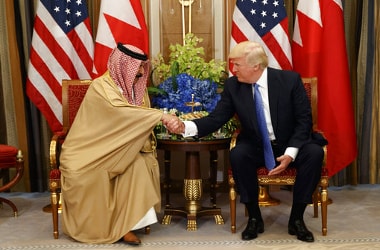
The United States and six Gulf countries on 23 May 2017 signed a Memorandum of Understanding (MoU) to curb financing terror organisations like Islamic State, Al-Qaeda, Hizbollah, Lashkar-e-Taiba, Taliban and the Haqqani Network.
The MoU was signed by the US and six members of the Gulf Cooperation Council (GCC) in Riyadh.
These six Gulf Countries are Bahrain, Kuwait, Oman, Qatar, Saudi Arabia and the United Arab Emirates.
The MoU was signed during US President Donald Trump’s historic visit to Saudi Arabia.
Under the MoU, all seven countries together aim to establish Terrorist Financing Targeting Center (TFTC).
The Terrorist Financing Targeting Centre will enhance existing tools and cooperation with partners in the Gulf to forcefully address evolving threats.
This collaboration will also address a host of other transnational threats originating throughout the Middle East, including from Iran, the Assad regime and the situation in Yemen.
These seven countries intend to identify, track and share information regarding terrorist financial networks and related activity of mutual concern.
The MoU is seen as a vital step against terrorist activities as it is believed that Gulf countries are a major source of funding major terrorist organisations across the globe including Lashkar-e-Taiba, which is responsible for major terror attacks in India.
Middle East Demographics: Know More- The Middle East is a transcontinental region centred on Western Asia and Egypt.
The corresponding adjective is Middle-Eastern and the derived noun is Middle-Easterner. - The term has come into wider usage as a replacement of the term Near East (as opposed to the Far East) beginning in the early 20th century.
- Arabs, Turks, Persians, Kurds, and Azeris (excluding Republic of Azerbaijan) constitute the largest ethnic groups in the region by population.
- Indigenous minorities of the Middle East include Jews, Assyrians and other Arameans, Baloch, Berbers, Copts, Druze, Lurs, Mandaeans, Samaritans, Shabaks, Tats, and Zazas. In the Middle East, there is also a Romani community.
- European ethnic groups that form a diaspora in the region include Albanians, Bosniaks, Circassians, Crimean Tatars, Franco-Levantines, and Italo-Levantines.